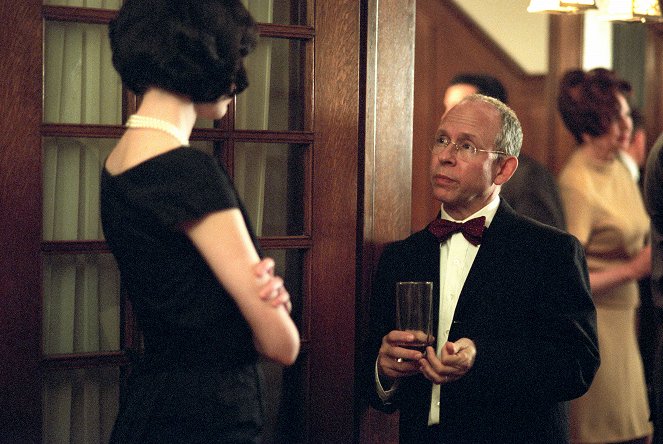Reżyseria:
Bennett MillerScenariusz:
Dan FuttermanZdjęcia:
Adam KimmelMuzyka:
Mychael DannaObsada:
Philip Seymour Hoffman, Catherine Keener, Clifton Collins Jr., Chris Cooper, Bruce Greenwood, Bob Balaban, Mark Pellegrino, Marshall Bell, Amy Ryan (więcej)VOD (4)
Opisy(1)
W listopadzie 1959 roku informacja o szokującej zbrodni dokonanej na rodzinie z małego miasteczka w Kansas zawładnęła umysłem Trumana Capote, autora słynnego Śniadania u Tiffaniego, w którego rolę po mistrzowsku wcielił się Philip Seymour Hoffman. Capote wraz ze swoją przyjaciółką z dzieciństwa Harper Lee (Catherine Keener) wyrusza, by wyświetlić motywy morderców. Chociaż początkowo jego dziecinny głos, dziwne maniery i niekonwencjonalne stroje wzbudzały wrogość wśród konserwatywnych mieszkańców Holcomb, Capote wkrótce zdobywa ich zaufanie. Nawiązuje też specyficzną więź ze skazanymi na karę śmierci zabójcami, stojącymi w obliczu zbliżającej się egzekucji. Powstała w wyniku tego książka Z zimną krwią zmienia kurs amerykańskiej literatury tworząc nowy gatunek - tzw. „literaturę faktu”. Zmienia się także sam jej autor, na którym rozmowy z mordercami wywarły niezatarte piętno. (Imperial Cinepix)
(więcej)Materiały wideo (1)
Recenzje (8)
Miller's film is strong in the details (the interviews with the killers, the final execution), but if it weren't for Hoffman, it would be just one among many, with nothing special or revelatory in terms of filmmaking or story. Capote himself is a guy I wouldn't go out for a beer with. His self-centred, manipulative and disgustingly pragmatic and cynical nature, often resorting to lies, is almost repulsive in places – it must have been a joy to play and such a beautifully written controversial character. The casting people should be applauded here, Hoffman's type - a mixture of loser and strong charisma - is quite ideal for such a role. He didn’t disappoint, he was great.
()
It’s too flat as a biography of a brilliant writer and too insubstantial as a film about a novel. In the film, Capote’s creative genius is limited to a few lame mentions of his previous work, and the actual creation of what is most substantial goes no further than what the viewer is able to form after reading "In Cold Blood" or watching Brooks' film of the same name. Phillip Seymour Hoffman's 100-minute homosexual creation thus becomes merely an aspirational pose that might have been provocative in the 1960s, but not today. The result is just an empty bubble, which at the time of its release got more flak than it perhaps deserved, and conversely, as a tribute to a brilliant storyteller, or rather a novel, it is about as impressive and original as a piece of marble.
()
The picture concentrates exclusively on the period that inspired the writing of one of the most fundamental American books of the 20th century - “In Cold Blood", the origin of the factual novel as such. A book that brought its author immortality and at the same time brought his fall into perdition. The subject is certainly intriguing, but Capote was such a complex and fascinating personage that the rather narrow focus of the story was rather a shame. It’s downright disappointing that the result is utterly humdrum and uninventive in all respects. The only element that saves it is the excellent performance from Hoffman, deservedly rewarded by more than one acting award. His performance precisely captures all nooks and crannies of Truman Capote’s soul. From homosexuality, through arrogance, calculating cunning, egoism to his desperate desire to be admired. And a warning concerning the Czech dubbing. Capote’s peculiar voice was difficult enough in the original to get right, but Hoffman did a splendid job of it. But in the Czech dubbed version, this literary heavyweight sounds like a pitiful caricature of himself.
()
The fact that Philip Seymour Hoffman talks for two hours like a homosexual man (which he actually plays) doesn't mean that he delivers an Oscar-worthy performance or nomination. The fact that the film tries to be a credible biopic about a world-renowned writer doesn't mean that it will become a cult-classic masterpiece that will go down in history. Not all biopics are created equal. Some directors are able to inject incredible energy, inventiveness, and dynamism into these types of projects, while others not. In the latter case, it becomes a dry exposition with a stark and emotionally detached statement that only lasts a few minutes after the opening. With Capote, it lasted about twenty seconds for me. One of the most boring and indigestible projects of the year.
()
It is possible to penetrate into the story of Capote proportional to how the viewer accepts the main character. Hoffman demonstrates almost extreme exhibitionism, although authentically, which almost repelled me from the film, but he approached me again thanks to the prison interviews, where he finally gained depth in intimate scenes. His frivolity later proves to be only a defensive weapon, but still, his interpretation remains on the border between overacting and artistic performance, fortunately closer to the latter option. The screenplay itself also remains somewhere in between. While the search for truth for the book is an excellent subject and gets under the viewer's skin almost on its own, feelings of guilt and the urgency of consequences do not have such power, and because the ending is almost only about them, Capote fizzles out when the final credits appear.
()



Reklama